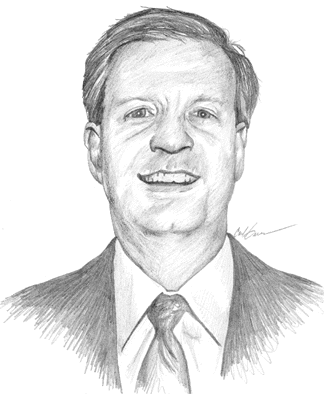INTERVIEW
The Global Trend
by Thom Hartle
STOCKS & COMMODITIES first spoke to hedge fund manager Mark Boucher in 1996, when he shared with us some of his key techniques for analyzing the economy, picking stocks, and money management. Now, in these days of market volatility, he has written a book called The Hedge Fund Edge: Maximum Profit/Minimum Risk Global Trend Trading Strategies. S&C Editor Thom Hartle again spoke with Boucher on September 23, 1998, via telephone interview to see what his work was pointing to now. This time, Boucher reviews key concepts such as the Austrian liquidity cycle, and then shares his current views for equity investors.

ILLUSTRATION BY CARL GREEN
You can boil our strategy down to "Select carefully, but carry a big net." Determine ways you can make money consistently, whether it is a real estate strategy, or a stock market strategy, or a bond market, or whatever. Then look at as many potential investments as you can. -- Mark Boucher
Refresh our memories with a bit of your history.
Sure. I started trading stocks and commodities when I was in high school. My father died when I was nine, and he left me a trust fund. The manager of my trust was looking after my college fund. Unfortunately, the stock market fell apart starting in 1973 and the bank managing my trust stayed 100% invested during the bear market. My account lost about 90% of its value.
You told me that last time, and it still hurts to hear it.
Me, too! I realized that I was going to have to find a way to make the money that was left go a long way. So I started trading the commodity markets in the late 1970s.
You were hoping to, in a sense, leverage yourself?
I wanted to make as much money as I could. Fortunately or not, I plunged into trading commodities. If you recall, during 1978 and 1979, the commodity markets shot up. I made quite a bit of money.
Sounds good.
In the next few years, though, I gave about half of it back before I realized that I had just been lucky in that period. I realized that I had a lot to learn if I wanted to create consistent performance. It became clear to me that the bull market was the genius, not me.
Bull markets can do that. And bear markets can take it away.
Exactly. And I think there is a good chance that a lot of your readers are going to find themselves in a very similar situation over the next year or so with regards to their trading stocks.
How so?
In more recent years, a lot of people have made quite a bit of money in a wild bull market that is, historically, an aberration. But at this point, there are global pressures coming to bear that -- and I can say this fairly confidently -- are creating a very poor investment climate. It's unlikely that equities will experience the same annual rate of return over the next 10 years that we saw over the last 10.
That's not good news.
No. There is a big shift taking place. For the most part, traders who have learned how to trade in the last 15 years either will have to change how they are trading, or else they may not show very much profit for a very long time.
Does your new book describe methods that support your views?
My goal in writing this book was to provide a number of different independent viewpoints or methods of analysis that add value in the investment process. Each technique independently should produce profits on its own, and do so in a way that beats the market.
I realized that I had a lot to learn if I wanted to create consistent performance. It became clear to me that the bull market was the genius, not me.Excerpted from an article originally published in the December 1998 issue of Technical Analysis of STOCKS & COMMODITIES magazine. All rights reserved. © Copyright 1998, Technical Analysis, Inc.